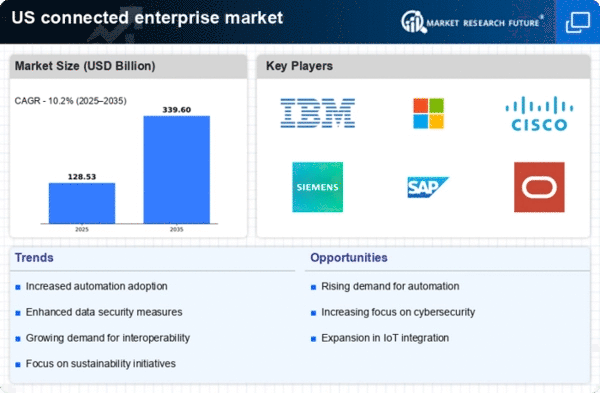Expansion of 5G Technology
The rollout of 5G technology is poised to have a transformative impact on the connected enterprise market. With its high-speed connectivity and low latency, 5G enables a new level of interconnectivity among devices and systems. This advancement is particularly beneficial for industries that rely on real-time data transmission, such as autonomous vehicles and smart cities. The 5G market is projected to reach $667 billion by 2026, indicating a substantial investment in infrastructure and technology. As businesses seek to leverage the capabilities of 5G, the demand for connected enterprise solutions that can operate effectively within this framework is expected to rise.
Rise of Automation Technologies
The connected enterprise market is experiencing a notable rise in automation technologies, which are transforming operational efficiencies across various sectors. Automation tools, such as robotic process automation (RPA) and artificial intelligence (AI), are being integrated into business processes, leading to enhanced productivity and reduced operational costs. According to recent data, organizations that adopt automation can achieve up to 30% cost savings in their operations. This trend is particularly evident in manufacturing and logistics, where automation streamlines workflows and minimizes human error. As companies increasingly recognize the benefits of automation, the demand for connected enterprise solutions that facilitate these technologies is expected to grow, driving the market forward.
Increased Focus on Data Analytics
Data analytics is becoming a cornerstone of decision-making in the connected enterprise market. Organizations are leveraging advanced analytics to gain insights from vast amounts of data generated by connected devices. This trend is particularly significant in sectors such as retail and healthcare, where data-driven strategies can enhance customer experiences and operational efficiencies. The market for data analytics solutions is projected to reach $274 billion by 2025, indicating a robust growth trajectory. Companies are increasingly investing in analytics tools to harness the power of big data, which in turn fuels the demand for connected enterprise solutions that enable seamless data integration and analysis.
Emphasis on Sustainability Initiatives
Sustainability is becoming an increasingly important focus within the connected enterprise market. Organizations are recognizing the need to adopt environmentally friendly practices and reduce their carbon footprints. This shift is driving the demand for connected solutions that optimize resource usage and enhance energy efficiency. For instance, smart building technologies can reduce energy consumption by up to 30%, aligning with corporate sustainability goals. As regulatory pressures and consumer expectations regarding sustainability grow, businesses are likely to invest more in connected enterprise solutions that support their environmental initiatives, thereby propelling market growth.
Growing Demand for Real-Time Monitoring
Real-time monitoring is emerging as a critical driver in the connected enterprise market. Businesses are increasingly seeking solutions that provide instant visibility into their operations, enabling them to respond swiftly to changes and challenges. This demand is particularly pronounced in industries such as manufacturing and supply chain management, where real-time data can significantly enhance operational efficiency. The market for real-time monitoring solutions is expected to grow at a CAGR of 25% over the next five years. As organizations prioritize agility and responsiveness, the connected enterprise market is likely to see a surge in solutions that facilitate real-time data access and analysis.

















Leave a Comment